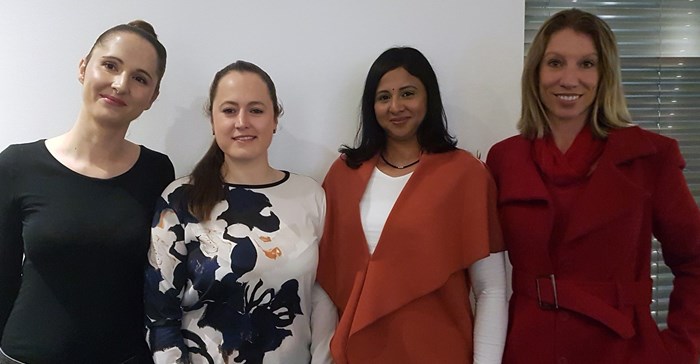For your marketing to become profit-driven, it's time to start asking the right questions. Three female marketers shared their secrets at Popimedia's recent profit-driven marketing breakfast.

Frost, Sharman, Lalloo and Steingold at Popimedia's female-led profit-driven marketing event.
On Thursday, 17 August 2017, Popimedia presented the Cape Town leg of its ‘women-leading profit-driven marketing’ workshop at the Fire & Ice Hotel to a fittingly female-first audience, with only two males in the mix. Lisa Steingold, head of marketing at Popimedia, shared the interesting story of how the potato became a sought-after item ages ago. No one was eating potatoes as the Catholic Church had banned them for not being mentioned in the Bible. In the 1700s, when people were dying of starvation, so King Frederick II of Prussia, AKA Frederick the Great, decided to fix things by rebranding the potato.
It was as simple as planting potatoes in the royal courtyard and loosely guarding them, so the people would steal them – steal them they did, in the hope of picking up some magical ‘royal properties.’ On how we got from there to here, Steingold said marketers shape the world, as we shape behaviour.
But Frederick the Great isn’t the current marketer in the know – Simone Frost, May Lalloo and Kirsty Sharman are. Here’s why…
Simone Frost, digital media specialist at Upstream Advertising, which provides marketing solutions to sell profitable insurance for the Telesure group, was up first with the gut-punch that “marketing as a cost centre is so yesterday.” She shared her learnings around metrics that truly matter in redefining digital marketing for profit.
Move from a data mentality to an information fortress of marketing intelligence
First is the insight that you can only manage what you can measure, and defining what matters is the start of a successful journey in profitable measurement. To do so, you need to constantly drive and design positive strategies that lead to ROI, and mine potential for new and existing customers, build ‘love brands’ through the customer satisfaction of promise delivery and turning overwhelming data into intelligent information. This is about more than just bank balance profit though – be careful not to discount the other metrics like engagement and conversion that give insight into your customer and marketing efforts.
Einstein said it best: “Not everything that counts can be counted, and not everything that can be counted counts,” so make sure you measure the things that matter. Frost said the way to do so is to identify the customer touch points you need to make more effective, thereby creating the ultimate customer experience.
Doing so gives you the chance to constantly lift the bar in a challenging-yet-achievable way, and set new targets for marketing spend efficiency as it’s a journey and not a destination. By measuring the profitability of your marketing efforts, you can scale spend on the right channels, so if one segment of your marketing strategy isn't yielding ROI, you can shift that to another area. In analysing where your marketing challenges are, you can also make changes to improve the overall strategy based on understanding the customer’s experience. Fail fast and keep growing. Practically every business decision needs to be based on an understanding of ROI, said Frost. She concluded, “measuring profitable marketing is no longer a nice idea but rather an imperative for corporate survival.”
May Lalloo, head of digital at Nestlé South Africa took to the podium next, asking how we find marketing utopia while also driving profit. She said the answer lies in providing agency partners with a clear brief, ensuring you have the right KPIs in place, produce creative that stands out from the clutter in order to be disruptive, and include a strong call to action in your messaging. If that seems overwhelming, follow Lalloo’s simple ‘Eat, pray love’ ABC process:
Beyond vanity metrics
- A is a brief so delicious, you could eat it
- B is creative so divine you would pray on it
- C is a media plan that will make you fall in love
Lalloo added that you need to make sure you have the right metrics in place, as it’s not just about collecting large fan bases. Times have changed, now ROI is more important than vanity metrics – a like of your brand’s Facebook status doesn't necessarily equate to a purchase.
Communication is also key here, not just internally as the team tends to get stuck in the idea and not realise where steps are missing. Communicating better externally means you’ll be able to track issues with campaigns, especially when localising global campaigns. Although you are likely situated in the same building, brand or department A doesn't necessarily know what brand or department B is doing. Have a fluid team structure and communicate across the board for deeper insights into your consumer. Having a cohesive team in place will help future-proof the organisation for change and disruption.
Another important factor for success with profit-driven marketing is designing your organisation by building teams and capabilities. Lalloo said marketing itself hasn't changed over the years, we just have sharper tools now to get the job done in a changing context. You need to make sure you're sending the same overall message across different platforms and not just storing that big data somewhere. Incorporate it into your systems so you can put it into use and personalise communication with your customers, as this builds loyalty over time.
The sleek startup mindset
Kirsty Sharman, COO of influencer marketing platform, Webfluential, was the final speaker of the morning. Introduced by Steingold as: "the ultimate geek girl knows everything about everything in the industry.
She said that marketing teaches you about branding and communication and running a company teaches you about profit. She’s been lucky enough to experience both, and shared the five things that running a software-as-a-service or SaaS platform taught her about profit-driven marketing with the hope that attendees would turn just one into an action when back at their desks.
- Make data your best friend. As the current trendy buzzword, we hear about big data all the time. Sharman says you can track, analyse and monitor that data all you want, but big data's value lies in the single actionable insight that you turn into an action point in your business that leads to profit.
- Harness the power of leverage. Sharman shared the example of Hotmail launching in 1996 and offering free email. To bulk up their subscriber base, they simply added a ‘PS I love you’ hyperlink to the end of those emails. When a Hotmail email recipient clicked on the link they got to read that their friend loved them enough to want them to have a free email address at Hotmail too. Sharman said to learn from this and leverage what you can from your own customers where you can, as well as from your business partners, resellers and business network.
- Ride the waves. Startups may have a financial disadvantage at first but Sharman says to turn that challenge into an advantage: Think on your feet and think smart by latching onto popular culture trends where they tie in with your brand’s vision. She cautions that you make sure that the trends you follow do actually lead to profit though, or you may be wasting your time and energy.
- Choose your agency based on these two questions: how many awards have you won for your clients in the last two years, and how many customers have you won for your clients in the last two years? An award won't pay your salary at the end of the month, which is why Sharman suggests put a customer counter rather than an award showcase at your reception. If clients don't answer the second question with more enthusiasm and clarity than they do the first, Sharman says to worry. It’s time for marketers as clients to start asking the right questions.
- Know why planners and strategists need to get their hands dirty. Sharman quoted, Warren Buffett who often reads for about 6 hours or 500 pages every single day with his right-hand man finishing double that. Buffett does so as he says that's how knowledge works, like compound interest. Similarly, Sharman says that her experience in running a SaaS platform on lean budgets is that results come from strategy that’s well executed. So the more you get your hands dirty, the more you learn and the more you learn, the better your strategies become.
Steingold ended by summing up the characteristics of a great marketer – curiosity, courage, failing fast, asking questions, putting your big girl parties on and starting again when you need to. We can all learn the skills, but those characteristics are deeply ingrained in those who prove successful in driving profit.
Interact with Frost, Lalloo and Sharman on Twitter this #WomensMonth and be sure to keep #BuildingBusinessonSocial with @PopimediaSocial.














































